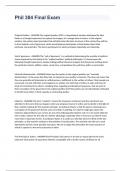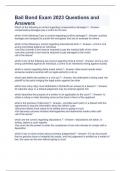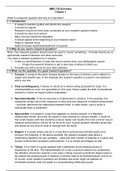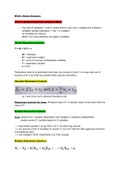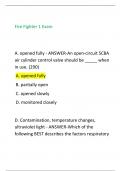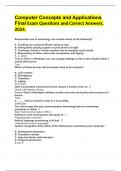Phil 384 Final Exam
Original Position - ANSWER-The original position (OP) is a hypothetical situation developed by John
Rawls as a thought experiment to replace the imagery of a savage state of nature. In the original
position, the parties select principles that will determine the basic structure of the society they will live
in from behind a veil of ignorance, which would deprive participants of information about their
particular characteristics. This forces participants to select principles impartially and rationally.
Veil of Ignorance - ANSWER-The "veil of ignorance" is a method of determining the morality of political
issues proposed by John Rawls in his "original position" political philosophy. It is based upon the
following thought experiment: people making political decisions imagine that they know nothing about
the particular talents, abilities, tastes, social class, and positions they will have within a social order.
Mutually Disinterested - ANSWER-Rawls says the parties in the original position are "mutually
disinterested," in the sense that they take no interest in one another's interests. This does not mean that
they are generally self-interested or selfish persons, indifferent to the welfare of others. Most people are
concerned, not just with their own happiness or welfare, but with that of others as well, and have all
kinds of commitments to others, including other-regarding and beneficent purposes, that are part of
their conception of the good. But in the original position itself the parties are not altruistically motivated
to benefit each other, in their capacity as contracting parties.
Maximin - ANSWER-The term "maximin" means the (maximum minimum) and the rule directs our
attention to the worst that can happen under any proposed course of action and to decide in the light of
that. Another backing for the maximin principle, according to Rawls, is that the person choosing has a
conception of the good such that he cares very little, if anything, for what he might gain above the
minimum stipend that he can, in fact, be sure of by following the Maximin rule. It is not worth while for
him to take a chance for the sake of a further advantage, especially when it may turn out that he loses
much that is important to him. According to Rawls, it is useful as a heuristic device to think of the two
principles, as the maximin solution to the problem of social justice. The maximin rule tells us to rank
alternatives by their worst possible outcomes. We are to adopt the alternative the most outcome of
which is superior to the worst outcomes of other
First Principle of Justice - ANSWER-First Principle: Each person is to have an equal right to the most
extensive total system of equal basic liberties compatible with a similar system of liberty for all
, Second Principle of Justice - ANSWER-Second Principle: Social and economic inequalities are to be
arranged so that they are both: (a) to the greatest benefit of the least advantaged, consistent with the
just savings principle, and (b) attached to offices and positions open to all under conditions of fair
equality of opportunity
Primary Goods - ANSWER-These goods are supposed to be desirable for every human being, just as they
are also useful for them. Thus, primary goods are the common base for the unanimous selection of the
justice principle in the original position.
Cooperation - ANSWER-Behavior by two or more individuals that leads to mutual benefit
Coordination - ANSWER-The organization of the different elements of a complex body or activity so as to
enable them to work together effectively.
Utility - ANSWER-Ability or capacity of a good or service to be useful and give satisfaction to someone.
Preferences - ANSWER-Individuals' choices, reflecting economic situation, religious values, ethnic
identity, or other valued interests.
Prisoner's Dilemma - ANSWER-A game in which pursuing dominant strategies results in noncooperation
that leaves everyone worse off
Arms Race - ANSWER-A competition between two parties in which they're motivated to improve out of
fear the other party will improve more, however these actions leave both parties worse off than if they
had not acted at all. It's a form of the Prisoner's dilemma.
Collective Action - ANSWER-How groups form and organize to pursue their goals or objectives, including
how to get individuals and groups to participate and to cooperate
Free Rider - ANSWER-A person who receives the benefit of a good but avoids paying for it
Strict Dominance - ANSWER-When one strategy for a player is better off than another strategy,
irregardless of what the other player(s) decides to do
Original Position - ANSWER-The original position (OP) is a hypothetical situation developed by John
Rawls as a thought experiment to replace the imagery of a savage state of nature. In the original
position, the parties select principles that will determine the basic structure of the society they will live
in from behind a veil of ignorance, which would deprive participants of information about their
particular characteristics. This forces participants to select principles impartially and rationally.
Veil of Ignorance - ANSWER-The "veil of ignorance" is a method of determining the morality of political
issues proposed by John Rawls in his "original position" political philosophy. It is based upon the
following thought experiment: people making political decisions imagine that they know nothing about
the particular talents, abilities, tastes, social class, and positions they will have within a social order.
Mutually Disinterested - ANSWER-Rawls says the parties in the original position are "mutually
disinterested," in the sense that they take no interest in one another's interests. This does not mean that
they are generally self-interested or selfish persons, indifferent to the welfare of others. Most people are
concerned, not just with their own happiness or welfare, but with that of others as well, and have all
kinds of commitments to others, including other-regarding and beneficent purposes, that are part of
their conception of the good. But in the original position itself the parties are not altruistically motivated
to benefit each other, in their capacity as contracting parties.
Maximin - ANSWER-The term "maximin" means the (maximum minimum) and the rule directs our
attention to the worst that can happen under any proposed course of action and to decide in the light of
that. Another backing for the maximin principle, according to Rawls, is that the person choosing has a
conception of the good such that he cares very little, if anything, for what he might gain above the
minimum stipend that he can, in fact, be sure of by following the Maximin rule. It is not worth while for
him to take a chance for the sake of a further advantage, especially when it may turn out that he loses
much that is important to him. According to Rawls, it is useful as a heuristic device to think of the two
principles, as the maximin solution to the problem of social justice. The maximin rule tells us to rank
alternatives by their worst possible outcomes. We are to adopt the alternative the most outcome of
which is superior to the worst outcomes of other
First Principle of Justice - ANSWER-First Principle: Each person is to have an equal right to the most
extensive total system of equal basic liberties compatible with a similar system of liberty for all
, Second Principle of Justice - ANSWER-Second Principle: Social and economic inequalities are to be
arranged so that they are both: (a) to the greatest benefit of the least advantaged, consistent with the
just savings principle, and (b) attached to offices and positions open to all under conditions of fair
equality of opportunity
Primary Goods - ANSWER-These goods are supposed to be desirable for every human being, just as they
are also useful for them. Thus, primary goods are the common base for the unanimous selection of the
justice principle in the original position.
Cooperation - ANSWER-Behavior by two or more individuals that leads to mutual benefit
Coordination - ANSWER-The organization of the different elements of a complex body or activity so as to
enable them to work together effectively.
Utility - ANSWER-Ability or capacity of a good or service to be useful and give satisfaction to someone.
Preferences - ANSWER-Individuals' choices, reflecting economic situation, religious values, ethnic
identity, or other valued interests.
Prisoner's Dilemma - ANSWER-A game in which pursuing dominant strategies results in noncooperation
that leaves everyone worse off
Arms Race - ANSWER-A competition between two parties in which they're motivated to improve out of
fear the other party will improve more, however these actions leave both parties worse off than if they
had not acted at all. It's a form of the Prisoner's dilemma.
Collective Action - ANSWER-How groups form and organize to pursue their goals or objectives, including
how to get individuals and groups to participate and to cooperate
Free Rider - ANSWER-A person who receives the benefit of a good but avoids paying for it
Strict Dominance - ANSWER-When one strategy for a player is better off than another strategy,
irregardless of what the other player(s) decides to do

